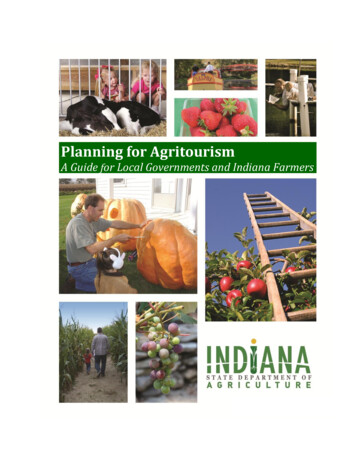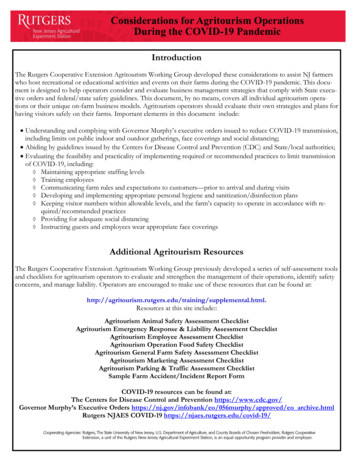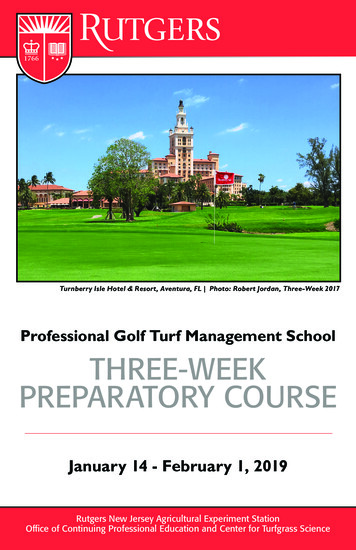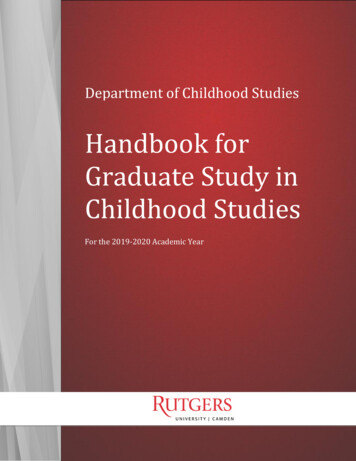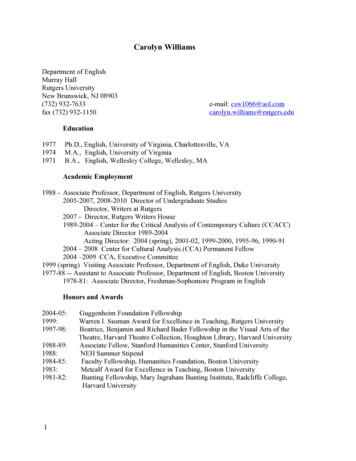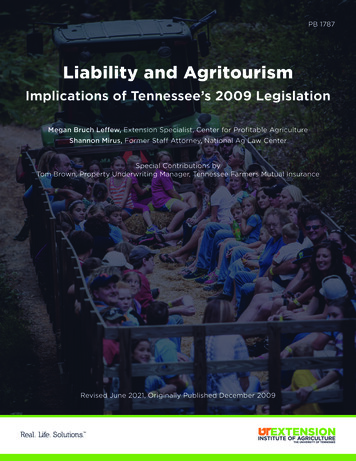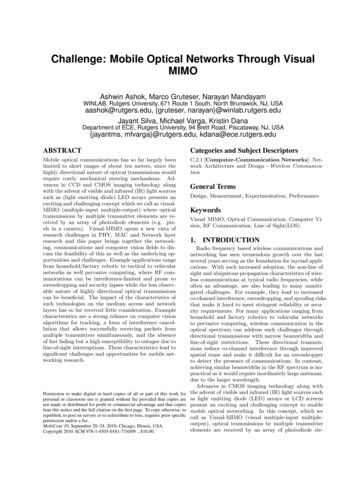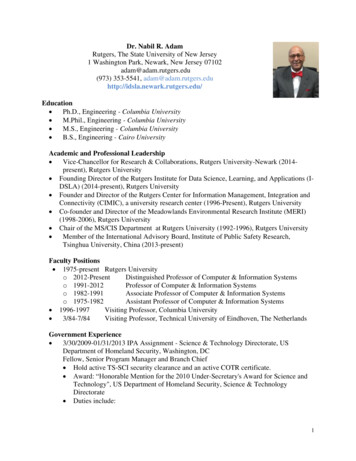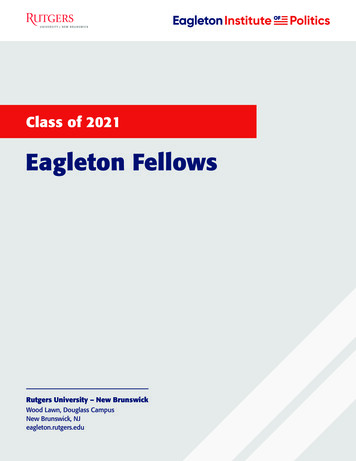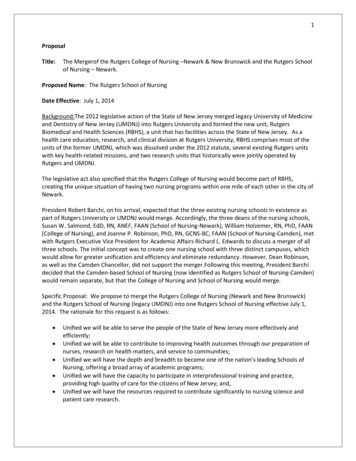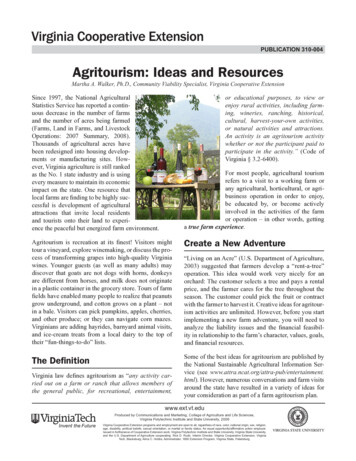
Transcription
publication 310-004Agritourism: Ideas and ResourcesMartha A. Walker, Ph.D., Community Viability Specialist, Virginia Cooperative Extensionor educational purposes, to view orenjoy rural activities, including farming, wineries, ranching, historical,cultural, harvest-your-own activities,or natural activities and attractions.An activity is an agritourism activitywhether or not the participant paid toparticipate in the activity.” (Code ofVirginia § 3.2-6400).Since 1997, the National AgriculturalStatistics Service has reported a continuous decrease in the number of farmsand the number of acres being farmed(Farms, Land in Farms, and LivestockOperations: 2007 Summary, 2008).Thousands of agricultural acres havebeen redesigned into housing developments or manufacturing sites. However, Virginia agriculture is still rankedas the No. 1 state industry and is usingevery measure to maintain its economicimpact on the state. One resource thatlocal farms are finding to be highly successful is development of agriculturalattractions that invite local residentsand tourists onto their land to experience the peaceful but energized farm environment.For most people, agricultural tourismrefers to a visit to a working farm orany agricultural, horticultural, or agribusiness operation in order to enjoy,be educated by, or become activelyinvolved in the activities of the farmor operation – in other words, gettinga true farm experience.Agritourism is recreation at its finest! Visitors mighttour a vineyard, explore winemaking, or discuss the process of transforming grapes into high-quality Virginiawines. Younger guests (as well as many adults) maydiscover that goats are not dogs with horns, donkeysare different from horses, and milk does not originatein a plastic container in the grocery store. Tours of farmfields have enabled many people to realize that peanutsgrow underground, and cotton grows on a plant – notin a bale. Visitors can pick pumpkins, apples, cherries,and other produce; or they can navigate corn mazes.Virginians are adding hayrides, barnyard animal visits,and ice-cream treats from a local dairy to the top oftheir “fun-things-to-do” lists.Create a New AdventureThe DefinitionSome of the best ideas for agritourism are published bythe National Sustainable Agricultural Information Service (see www.attra.ncat.org/attra-pub/entertainment.html). However, numerous conversations and farm visitsaround the state have resulted in a variety of ideas foryour consideration as part of a farm agritourism plan.Virginia law defines agritourism as “any activity carried out on a farm or ranch that allows members ofthe general public, for recreational, entertainment,“Living on an Acre” (U.S. Department of Agriculture,2003) suggested that farmers develop a “rent-a-tree”operation. This idea would work very nicely for anorchard: The customer selects a tree and pays a rentalprice, and the farmer cares for the tree throughout theseason. The customer could pick the fruit or contractwith the farmer to harvest it. Creative ideas for agritourism activities are unlimited. However, before you startimplementing a new farm adventure, you will need toanalyze the liability issues and the financial feasibility in relationship to the farm’s character, values, goals,and financial resources.www.ext.vt.eduProduced by Communications and Marketing, College of Agriculture and Life Sciences,Virginia Polytechnic Institute and State University, 2009Virginia Cooperative Extension programs and employment are open to all, regardless of race, color, national origin, sex, religion,age, disability, political beliefs, sexual orientation, or marital or family status. An equal opportunity/affirmative action employer.Issued in furtherance of Cooperative Extension work, Virginia Polytechnic Institute and State University, Virginia State University,and the U.S. Department of Agriculture cooperating. Rick D. Rudd, Interim Director, Virginia Cooperative Extension, VirginiaTech, Blacksburg; Alma C. Hobbs, Administrator, 1890 Extension Program, Virginia State, Petersburg.
Ice cream parlor or bakeryPotential Agritourism ActivitiesJam- and jelly-making demonstrationsAgricultural museum and displaysMeeting barnyard animals (participating in educationalprograms focusing on each animal: shear the sheep,milk the “demonstration” cow, or participate in “cattlecollege”)ArcheryBarn dancesBed and breakfast accommodationsMusic events (banjo and guitar lessons), concerts, andfestivals. (Refer to Preparing for an Agritourism Event:A Checklist, Virginia Cooperative Extension publication 448-501; g trailsBird watchingBirthday partiesBreweriesCabin livingOrchards and pick-your-own (picking, sitting, picnicsunder the trees)Campfires (don’t forget the marshmallows)Pancake breakfastsCampingPlant a gardenCanning producePony and horseback ridingCanoeingPumpkin patch (picking, painting, carving, and buying)Corn mazesQuilting/weaving exhibitionsCorporate and group eventsRestaurants/dining (farm food, slow dining, Sundaybrunches, or local foods)Cut flowers (picking, arranging, and planting)Snow sleddingCut-your-own Christmas tree and evergreensSorghum millingFarm cooking contestsStargazing and moonlight activitiesFarm scavenger huntsStorytelling/story swapsFarm stores and marketsStraw bale mazeFarm vacations (a day or a week on the farm: living,working, enjoying)Tours for children and familiesFee-fishing pond (fishing, cleaning, and cooking)Vegetable contestsFlower arranging workshopsVirginia Standards of Learning and the farmHaunted barnsWeddingsHay wagon ridesWinemaking and tastingHeirloom plant and animal exhibitsWineriesHerb walksHeritage trailsHiking paths (walking, identifying vegetation, determining a tree’s age, picnicking)Historic reenactments“How-to” clinicsHunting2
you need to consider how to continually create newadventures to attract new guests and entice those whohave already visited the farm to return. When considering growth, assess space limitations, availability ofparking, maximum number of people who can besafely transported, time required to travel aroundthe activity area, and seating capacity for activities.u Understand your liability. When visitors arrive onyour property, liability increases. Identify risk-management issues, implement safety plans to preventidentified risks, and obtain the necessary insurancecoverage for your specific operation. Wise agritourism entrepreneurs consult their attorneys and insurance agents prior to opening their doors to guests.Agritourism PartnersAgritourism is a growing industry within the commonwealth that is supported by the partnership of VirginiaTourism Corporation, Virginia Department of Agriculture and Consumer Services (VDACS), and VirginiaCooperative Extension. Farm owners considering agritourism as a tool to sustain or expand farm profitabilitymust examine the business model, entertainment options,operation logistics, and liability issues and coverage.u Develop partnerships. Talk to neighbors aboutyour plans and ask for their support. Inform youreconomic development office and Chamber ofCommerce about your plans to open a new businessenterprise. Review road signage and confirm thatdirections to the farm are clearly marked.u Inventory existing attractions. Ask the local tourism office to provide assistance in reviewing yourpublicity plan and linking to other local activities.Determine if other farms in the region are engagedin agritourism activities and explore the idea of allthe farms developing a publicity partnership.Agritourism operations are challenged by the cost ofand access to insurance and liability coverage, unpredictable weather, the seasonal nature of the operation,health and code inspections, and the struggle to providecustomer service to the sometimes not-so-agreeablepublic. These factors cannot be addressed in detail injust one document; they require the involvement of multiple experts and numerous face-to-face discussions.u Visit other agritourism farms. VDACS maintainsa list of agritourism farms throughout the commonwealth at www.vdacs.virginia.gov/news/c-tourism.shtml.Get Startedu Add your operation to tourism websites. Contactthe Virginia Tourism Corporation at www.virginia.org, and scroll to the bottom of the page to select“Add/Update a Listing.” (You will need to registerfor a free account.) Also be sure to list your operation with VDACS.Before opening the your doors to the public, take time tothink about your options and the impact your choices willhave on reaching your goals. There are some key stepsto developing and implementing a successful plan.u Create a plan. What farm experience can youoffer the public that will make your operationunique, in compliance with all local ordinances andcodes, and profitable? Your local Extension agentand farm management agent can help you identify alternatives. In addition, Agritourism, VirginiaCooperative Extension publication 310-003, pubs.ext.vt.edu/310/310-003/310-003.html, provides anexcellent guide for developing a plan.u Know your customers. Long-time agritourismentrepreneurs know that their customers want to slowdown, relax, and truly enjoy a farm experience.u Set guiding rules for all farm visitors and communicate them clearly. You will want to make thevisit a wonderful experience for each guest. However, guests must follow the rules for handling animals, traveling through open fields, and avoidingareas that are not visitor-safe.u Plan to grow your business. After developing theinitial plan to establish an agritourism business,3
Conduct Researchu Selected Topics for On-Farm Direct Marketing,Virginia Cooperative Extension publication 438109, provides an excellent resource for developingfacilities to sell farm-grown products to the public using well-defined merchandising strategies;pubs.ext.vt.edu/438-109/438-109.html.To support your initial investigation, Extension hascompiled a list of agricultural tourism publications andwebsites packed with suggestions, experiences, andfacts. Hopefully the following resources will provideyou with a strong base of information on agritourismand the data needed to guide your decision-makingprocess. This resource list is just the beginning. It canspark unique ideas that – combined with energy andenthusiasm – can be implemented to make your agritourism adventure a one-of-a-kind destination.u Direct Farm Marketing and Tourism Handbook,developed by the Department of Agriculturaland Resource Economics, University of Arizona.Includes an excellent source for developing a business plan; ted Reading Listu Direct Marketing Options for Farmers, from University of Wisconsin Cooperative Extension, definesoptions available to local farms; A3811-11.pdf.Agritourismu Agricultural Tourism: Helpful Agricultural Tourism (Agritourism) Definitions, published by theSmall Farm Center at the University of CaliforniaCooperative Extension; www.sfc.ucdavis.edu/agritourism/definition.html.u How to Direct-Market Farm Products on theInternet is provided by the USDA and “designedto assist small/medium-sized agricultural producersdevelop Internet-based sales”; www.ams.usda.gov/AMSv1.0/getfile?dDocName STELDEV3101222&acct wdmgeninfo.u Virginia Department of Agriculture and Consumer Services lists numerous farms and othervenues engaged in agritourism on its Agritourismwebsite; www.vdacs.virginia.gov/news/c-tourism.shtml.u Using the Internet to Get Customers, publishedby the Southern Sustainable Agriculture WorkingGroup; www.ssawg.org/documents/IBSbasictraining.pdf.u The Virginia General Assembly defined agritourism activity as “any activity carried out on a farmor ranch that allows members of the general public, for recreational, entertainment, or educationalpurposes, to view or enjoy rural activities, including farming, wineries, ranching, historical, cultural,harvest-your-own activities, or natural activitiesand attractions. An activity is an agritourism activity whether or not the participant paid to participatein the activity.” § 3.2-6400.u Roadside Stands, developed by Washington StateUniversity, contains numerous links on design,on-farm cooling, agritourism, and legal concerns.Although most references relate to the state ofWashington, many will provide helpful guidancefor Virginia producers interested in developingtourism options. .u Agritourism, Virginia Cooperative Extension publication 310-003, delivers a comprehensive lookat agritourism and includes information on riskmanagement, zoning, environmental regulations,and other factors that affect a successful .u Preparing for an Agritourism Event: A Checklist,Virginia Cooperative Extension publication 448501, guides you though the planning and implementation phases for hosting a large event on your farm;pubs.ext.vt.edu/448/448-501/448-501.html.4
u Entertainment Farming and Agritourism:Business Management Guide, developed bythe National Center for Appropriate Technology(NCAT) Agriculture Specialist Katherine L. Adam.Dr. Adam reviews “entertainment farming” diversification options that work to add stability to farmincomes. She identifies three agritourism basics: 1)have something for visitors to see, 2) something forthem to do, and 3) something for them to buy; andsuggests numerous events and key activities to addvalue to your agritourism business; insu Agricultural Tourism Operation Fact Sheets, aseries of online fact sheets for agricultural tourismoperations, developed by the University of California Small Farm Program; www.sfc.ucdavis.edu/agritourism/factsheets.html.u Specialty Crop Profile: Pumpkins, Virginia Cooperative Extension publication 438-100, by Extension specialist Anthony Bratsch, offers advice onpotential markets, site selection, cultivar recommendations, crop management, and .html.Corn Mazes: Companies that contract to create cornmazes.u The MAiZE; www.cornfieldmaze.com.Economic Impact Studiesu Maize Quest Corn Mazes; www.cornmaze.com.u “Natural Wonders: Agritourism offers farmers anew way to bring home the bacon” by Art Latham,published in Perspectives (Fall 2002), magazine ofN.C. State’s College of Agriculture and Life Sciences, uses figures from the North Carolina Department of Tourism to support its premise that visitorswill spend money if farmers group together andprovide a tourist destination. “While the North Carolina Cooperative Extension agents who focus onalternatives to traditional agriculture don’t promisea total solution to a complex problem, they’re convinced that one answer for farm families is the culture of agriculture itself, spiffed up in a shiny newpackage aimed at upscale vacationers ‘It maynot be the total answer, but it will definitely helpkeep the family farm alive.’” tm.u Precision Mazes; www.precisionmazes.com.u MazePlay can assist with corn maze designs andconstruction; www.mazeplay.com.u Cows-N-Corn in Midland, Va., offers dairy farmtours and corn maze adventures. The farm is ownedand operated by the Jeff and Patty Leonard family;www.cows-n-corn.com.u You may also want to visit Pattie and David Owenat Owen Farm Tours in Danville, Va.; www.owenfarmtours.com; and Bobby Williams at WilliamsOrchard in Wytheville, Va.; www.williamsorchard.com.u The Georgia Economic Issues Newsletter (April2003), a publication of the University of GeorgiaCooperative Extension Service, defines agritourism and nature-based tourism in the article, “CanGeorgia Communities Benefit From Agritourism and Nature-Based Tourism?” It reports findings from a 2003 study that assessed “the potentialmarket and economic impacts of both agritourismand nature-based tourism” by examining the potential economic impact of a rural recreational guide5
for hunting, fishing, and wildlife on 14 counties insouthwest Georgia. 3ntscp.htm.u Virginia Department of Agriculture and Consumer Services provides an excellent source ofdata on farm commodities, land, markets, and economic impact of agriculture; www.vdacs.virginia.gov/agfacts/index.html. The Consumer Servicesportal provides information on “Virginia Grown”programs; www.vdacs.virginia.gov/vagrown/index.html; and “Virginia Finest” products and information on food safety, organic farming, and otherresources; www.vdacs.virginia.gov/consumer/index.html. Look for companies within your communityat www.shopvafinest.com/.u Recreation, Tourism, and Rural Well-Being(August 2005) is an economic research report published by the USDA Economic Research Service.Using regression analysis, the study assesses “theeffect of recreation and tourism development onsocioeconomic conditions in rural recreation counties.” www.ers.usda.gov/publications/err7/.u Virginia Tourism Corporation provides excellentdata on tourism and its economic impact at its website; www.vatc.org/research. The company alsoprovides Economic Impact of Travel reports bylocality, including admissions, lodging, and restaurant tax rates; www.vatc.org/research/ecomonicimpact.asp.u USDA Agricultural Marketing Service providesState Marketing Profiles with Virginia’s demographic and consumption profile available at www.ams.usda.gov/AMSv1.0/. (Select “Wholesale andFarmers Markets,” then select State Marketing Profiles.) Choose other options to get information onfarmers markets, marketing research, organic agriculture, and/or Virginia in Brief.Data Sourcesu When looking for the latest agricultural statistics ona given region in Virginia, visit the USDA NationalAgricultural Statistics Service website; www.nass.usda.gov/Statistics by State/Virginia/index.asp. For reports and data sets covering the UnitedStates and international agriculture, refer to theEconomic, Statistics, and Market InformationSystem, a joint project of the USDA and CornellUniversity; www.usda.mannlib.cornell.edu/MannUsda/homepage.do; and the USDA EconomicResearch Service; www.ers.usda.gov/.Federal Data Sources Suggested by CornellUniversityu Agricultural Census Data by State includes summaries by the Economic Research Service of USDAfor agricultural, farmland, and demographic data;www.ers.usda.gov/.u USDA National Agricultural Statistics Servicereports agriculture census information available bystate and county; www.nass.usda.gov/.u USDA National Agricultural Statistics Service.Farms, Land in Farms, and Livestock Operations:2007. (2008); www.nass.usda.gov/Publications/Todays Reports/reports/fnlo0209.pdf.u USDA/Economic Research Service (ERS) provides the main source of economic information andresearch from the USDA, including a summary offederal laws and regulations affecting agriculturalemployers, and a section on organic farming andmarketing; www.ers.usda.gov/Emphases/Rural/.u Social and Economic Data Web Site, supportedby the Social Sciences Institute of NRCS, bringstogether a combination of more than 200 countylevel variables from the U.S. 2000 General Population Census, the 1997 U.S. Agricultural Census, andspecial agricultural census information provided by6
Photo CreditsCows-N-CornMidland, Va.Jeff and Patty Leonard family, ownerswww.cows-n-corn.comFishwood Farm AlpacasAppomattox County, Va.JoAnn and Dan Wood, and Nancy Fish, ownerswww.fishwoodfarm.com/Hickory Hill Vineyards & WinerySmith Mountain Lake, Va.Roger and Judy Furrow, ownerswww.hickoryhillvineyards.comthe National Agricultural Statistical Service; www.ssi.nrcs.usda.gov/customdata/index.html.Owen Farm ToursDanville, Va.David and Pattie Owen family, ownersu County Business Patterns does not include farming, but this Census Bureau data includes numberof firms, number of employees, and payroll for agribusinesses, food processing, and all other NAICS(North American Industry Classification System)business categories at the county level; rs.comPeaks of Otter WineryBedford, Va.Danny and Nancy Johnson, ownersPeaks of Otter Winery’s “Chili Dawg” wine won a2009 Scovie Award for its 3rd-place finish in the beverage category.u Regional Economic Information System (REIS)provides detailed data compiled by the U.S. Bureauof Economic Analysis on personal income, sales,and other measures for both farm and non-farmbusiness categories; aksofotterwinery.comRockCliffe Farm Retreat & LodgeAppomattox County, Va.u U.S. Census Bureau’s American FactFinder is anexcellent source for population, housing, economic,and geographic data; factfinder.census.gov/.Hugh Radcliffe and Joan Rockwell, ownerswww.rockcliffefarm.com/AcknowledgementsThe author sends a special note of appreciation tothe reviewers for their partnership in exploring theseideas and offering their best suggestions. This publication was strengthened because of the work of AndyHankins, Virginia State University; Denise Mainville,Ph.D., Virginia Tech; Andy Overbay, Ph.D., VirginiaCooperative Extension; and Jesse Richardson, VirginiaTech.7
Tech, Blacksburg; Alma C. Hobbs, Administrator, 1890 Extension Program, Virginia State, Petersburg. publication 310-004 Agritourism: Ideas and Resources Martha A. Walker, Ph.D., Community Viability Specialist, Virginia Cooperative Extension Since 1997, the National Agricultural Statistics Service has reported a contin-
